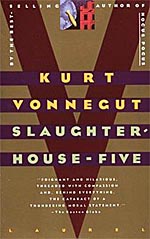
![]() Emil
Emil
12/20/2010
![]()
The bombing of Dresden by the Royal Air Force and the United States Army Air Force between 13 February and 15 February 1945, remains one of the more controversial Allied actions of the Western European theatre of war. The inhabited inner city of Dresden was largely destroyed. Some of the Allies described the operation as the justified bombing of a military and industrial target. Prime Minister Winston Churchill, who once said, "There is no middle course in wartime," tried to distance himself from the attack, even though he was heavily involved with the organization and planning of the raid. Several researchers have argued that the February attacks were disproportional.
Slaughterhouse-Five is based on Vonnegut's shattering experience as a POW in Dresden during this raid. Through the fantastic (imaginary?) odyssey of Billy Pilgrim, a man unstuck in time after he is abducted by aliens from the planet Tralfamadore, Vonnegut prompts the inescapable (and timeless) question about the conduct of war: what should be its limits? It is a grand, eloquent and deeply funny tale that surreptitiously reflects the mythic journey of our own fractured lives as we search for meaning in a world incorrigibly corrupted by the dichotomy of a tawdry existence. Churchill's hard truth about wartime and Vonnegut's privy relevations, often followed by the dispassionate phrase "So it goes" forces us to recognize another hard truth: that every war, however justified it may be, reduces the stock of human good, and diminishes civilization and as witnessed by the destruction of Dresden, often destroying in seconds what took centuries to build.
The reader can be fooled by the ease of reading, the humor and various anachronisms of the fast-paced telling, giving the subject matter a unique poignancy. But this is no comedy. A true war story is never pleasant, never imparts moral indignations and is rarely uplifting, to paraphrae Tim O'Brien from The Things They Carried. "If in the end of a war story you feel uplifted, or you feel that some small bit of rectitude has been salvaged from the larger waste, then you have been made the victim of a very old and terrible lie." True war is never glorified. Slaughterhouse-Five is hard-hitting. Life is not fair, even unjust. Almost everyone has occasionally found existence meaningless or hard to get through. And Billy experiences this first-hand - a depersonalization and indeed dehumanization of the most personal of human experiences. Can he blamed for escaping into (crappy) science fiction when the burden becomes too much? In fact, his pain is so deep and goes so far beyond our day-to-day relationship and family troubles that he really starts to lose himself, literally, in fiction. People, like his daughter, think him insane and realistically seen, they may be correct. He may well be "telegraphic schizophrenic" - who (in their right mind) believes one can shift oneself between different time periods, whether it is the Second World War, Dresden, Tralfamador, weddings or a veteran's hospital? No, it is much easier to believe that such phenomena are unrealistic.
Vonnegut explores fate, free will and the illogical nature of human beings. Free wil does not exist. History progresses and man has no power to influence the future, or his own actions. Human actions are free and yet we work towards an inevitable end, wonderfully expressed by the Tralfamadorians' own acknowledgement that they will destroy the universe in the future because of an experiment that went astray - they will not do anything to prevent this. Therefore, acceptance is the only appropriate response - resistance against the inevitability of things is futile. The story's central concept, eerily, is that most of humanity is insignificant. People do what they do, because they must.
But Slaughterhouse-Five is also an anti-war dialogue. And therefore we cannot ignore war when we have free will. Nevertheless, Vonnegut never explicitly states that we actually have free will. This is satire at its very best, showing, through Billy's difficulties to understand these concepts, that free will is really nothing more than a product of human irrationality. If the reader doubt this, Vonnegut sets us straight: as if the bombing of Dresden wasn't senseless enough, we find even more senselessness in the summary execution of a man who committed a petty theft. Amid all that horror, death, and destruction, time is taken to punish one man. The telling closes with a jabbering bird, symbolizing the lack of anything intelligent to say about war. Birdsong rings out alone in the silence after a massacre, and "Poo-tee-weet?" seems about as appropriate a thing to say as any, since no words can really describe the horror of the Dresden firebombing. The bird sings outside of Billy's hospital window and again in the last line of the book, asking a question for which we have no answer, just as we have no answer for how such an atrocity as the firebombing could happen ... or any other in the world today.
The book was first published in 1969, 25 years after the Dresden firebombing, but only one year after the hugely unpopular Vietnam War Tet Offensive, just as the anti-war movement really started to intensify in the U.S. In the middle of growing demands to end the war in Vietnam, Slaughterhouse-Five, as most commentators elude to, seemed to express the emerging popular horror at the idea of war, and - considering the world today - is still very relevant as an anti-war drama. It expresses in lucid, even sinewy, scenes what comes after war with the efforts of rebuilding a life and recapturing humanity by someone who experienced the total randomness of fate and the indiscriminate effect of incendiary bombings. Collateral damage, indeed, has a human face.